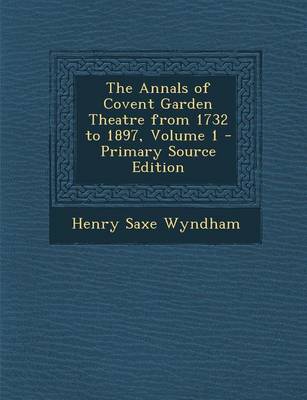Cambridge Library Collection - Music
2 primary works • 4 total works
Volume 1
Annals of Covent Garden Theatre from 1732 to 1897, Volume 1
by Henry Saxe Wyndham
Published 3 January 2010
Commissioned by the enterprising actor-manager John Rich, Covent Garden's Theatre Royal first opened its doors in December 1732. Principally a playhouse during its first century, the venue has had an eventful history involving two disastrous fires and riots over ticket prices. Most notably, it hosted Handel's incomparable operas and oratorios, and was where he presented regular seasons from 1735 until his death in 1759. Not until 1847, under Michael Costa, did the theatre dedicate itself to opera, and in 1892 it received the name by which it is known today: the Royal Opera House. Secretary of the Guildhall School of Music from 1901 to 1935, Henry Saxe Wyndham (1867-1940) published this richly illustrated two-volume account in 1906, celebrating the venue's legendary personalities and productions. Volume 1 covers the period 1732 to 1819 and includes discussion of John Rich, John Philip Kemble, Sarah Siddons, and Handel's operas.
Volume 2
The Annals of Covent Garden Theatre from 1732 to 1897: Volume 2
by Henry Saxe Wyndham
Published 3 January 2010
Commissioned by the enterprising actor-manager John Rich, Covent Garden's Theatre Royal first opened its doors in December 1732. Principally a playhouse during its first century, the venue has had an eventful history involving two disastrous fires and riots over ticket prices. Most notably, it hosted Handel's incomparable operas and oratorios, and was where he presented regular seasons from 1735 until his death in 1759. Not until 1847, under Michael Costa, did the theatre dedicate itself to opera, and in 1892 it received the name by which it is known today: the Royal Opera House. Secretary of the Guildhall School of Music from 1901 to 1935, Henry Saxe Wyndham (1867-1940) published this richly illustrated two-volume account in 1906, celebrating the venue's legendary personalities and productions. Volume 2 covers the period 1819 to 1897 and includes appendices which list principal events and managers.
Of German birth, Sir August Friedrich Manns (1825-1907) secured for himself a central place in nineteenth-century British musical life. Appointed by George Grove in 1855 to conduct the orchestra at the relocated Crystal Palace in Sydenham, ande held the post for more than four decades, establishing a high reputation for the Saturday Concerts and attracting internationally recognised soloists. Manns was involved in every aspect, from developing the repertoire to taking rehearsals. Under his baton, many of the great works of Brahms, Schubert and Berlioz received their first British performances, alongside world premieres of pieces by British composers such as Sullivan and Macfarren. Secretary of the Guildhall School of Music, Henry Saxe Wyndham (1867-1940) published in 1909 this engaging portrait of a musician greatly esteemed by players and audiences alike.
The Annals of Covent Garden Theatre from 1732 to 1897 2 Volume Set
by Henry Saxe Wyndham
Published 21 November 2013
Commissioned by the enterprising actor-manager John Rich, Covent Garden's Theatre Royal first opened its doors in December 1732. Principally a playhouse during its first century, the venue has had an eventful history involving two disastrous fires and riots over ticket prices. Most notably, it hosted Handel's incomparable operas and oratorios, and was where he presented regular seasons from 1735 until his death in 1759. Not until 1847, under Michael Costa, did the theatre dedicate itself to opera, and in 1892 it received the name by which it is known today: the Royal Opera House. Secretary of the Guildhall School of Music from 1901 to 1935, Henry Saxe Wyndham (1867-1940) published this richly illustrated two-volume account in 1906, celebrating the venue's legendary personalities and productions. Volume 1 covers the period 1732 to 1819. Volume 2 covers the period 1819 to 1897. The appendices list principal events and managers.

